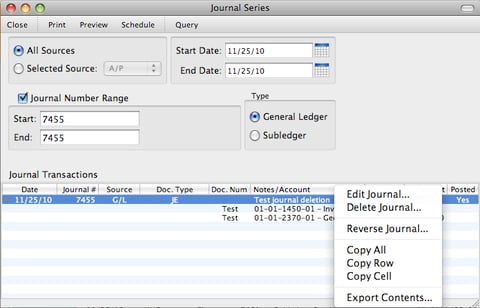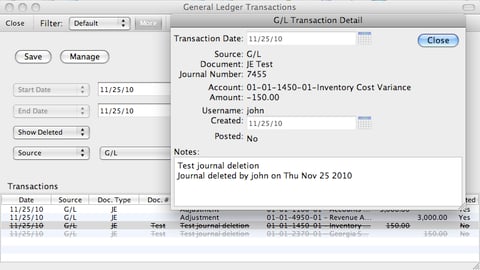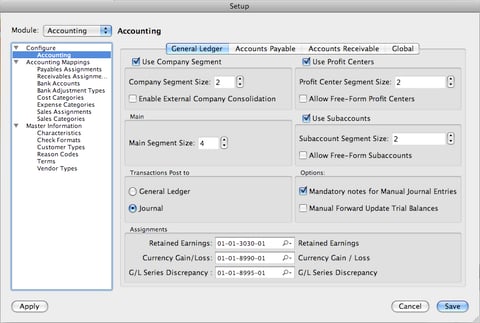
I've worked with several accountants over the years and one thing I've noticed about them is that they generally like things neat and orderly. Unfortunately the real world is often messy and chaotic. Transactions get entered for the wrong accounts, quantities or dates, which leads to reversal transactions, then yet another set of corrected transactions. Even with a flawless transaction record a company of even a moderate size can end up with thousands of general ledger (G/L) entries that make finding the source transaction of any questionable trial balance number like looking for the proverbial needle in a haystack.
For accountants in the real world, several features in your business accounting software can make life cleaner and more manageable, including a smarter G/L account search widget, the ability to modify erroneous general entries and an optional Journal system.
What should you look for in a G/L account search widget? Requirements include: auto-completer functionality found throughout the system, along with the ability to jump to and create or edit account numbers directly from the widget for those with privileges to do so, pre-sets to search on the appropriate account types for their context. For example, if the expected account number in a particular context should either be an asset or liability account, then only account numbers for those types are listed on a search. That protective feature alone can help prevent errors in set up and ongoing business transactions. For those who are concerned about loss of flexibility, however, have no fear: You should still be able to type in an account number for an "incorrect" type, and it will be accepted, but not before warning you of potential "unexpected" results.
What feature in your accounting system should you look for to handle erroneous general entries? Requirements include the ability to modify posted journal entries. Your accounting solution may have considered the deletion and editing of any G/L transaction as an absolute no-no, however this makes life hard in the real world. Mistakes happen. See if your system uses the notion of a "soft" delete of manually entered transaction types (Journal Entry and G/L Series). A soft delete means that the record is flagged as deleted in the database, disappears from most reports, and its amounts are removed from the trial balance... but the record still exists. This way you get the best of both worlds: the flexibility to "delete" unwanted transactions, but a complete audit trail remains of all activity. Deletions can be performed on qualifying transactions from a G/L series display. Example:

The screenshot below demonstrates how you could still view "deleted" transactions by setting the option to do so on the G/L Transactions report. The drill down reveals that the transaction notes were automatically stamped with the name of the user and time of deletion.

Another option you should have: "editing" manual journal entries posted directly to the General Ledger. What happens when you do this is the original entries are marked as deleted, then copied into a new G/L Series which is opened into the G/L Series editing window. You can edit them however you like, then re-post. The edited series will have the same journal number as the previous, but the history of the original entries will still exist and be audit-able in the same way as deleted entries are. An important requirement: "privilege control" over the ability to delete and edit posted journal entries. If you do not grant privileges for anyone to use these features (which is the default), then this behavior will not be allowed.
Does your accounting system have the notion of new intermediate journals that contain transactional detail that supports the G/L (not to be confused with the Journal Entry transaction type, which can be used whether this Journal functionality is turned on or not). In some accounting systems any kind of financial transaction created is posted directly to the G/L rather than aggregate postings from all the detail into a summarized G/L posting thereby allowing you to potentially distill thousands of General Ledger transactions down to just a few. You should be allowed the functionality of the posting of journals daily, monthly or weekly, as an option. Once turned on, all financial transactions are posted to Journals instead of the General Ledger, and transactions recorded as Journals do not affect the trial balance until they are posted to the General Ledger. Example:

In this example, to find out where the numbers came from, you can right click and drill into the transactional detail behind these numbers. This right click drill down is also available from the G/L transactions window and the G/L Series window even after the Journals are posted.
One of the great things about this Journal feature is that not only does it do a nice job of consolidating things, but it gives you a chance to review and potentially reverse or correct any errant transactions before they muck up your General Ledger. But guess what? Even if some of these bad transactions make it through to the G/L, you can also perform the same soft deletion of Journal postings as you can with Journal Entries posted directly to the G/L. If you do this, the Journal transactions are reverted back to their original state so you can make any necessary corrections and repost the set.
Finally, there's one other nice thing about Journals: You can distribute them on whatever date you wish. So if you ever have the problem of wanting to back or forward date transactions after the fact, Journal postings give you a flexible mechanism to do this.
There are lots of powerful convenience functionality in accounting systems for accountants. Most amazingly, with these tools it is now possible for that obsessive compulsive accountant you know (or are) to manage a completely clean and pristine General Ledger even when all the world around you is doing its best to make a big mess.
Contact
xTuple
A CAI Software Company
24 Albion Rd, Suite 230
Lincoln, RI 02865
+1-757-461-3022
About
"xTuple" (verb) — to grow; to increase exponentially. Our mission is to help manufacturing and inventory-centric companies use management software and best practices to grow their business profitably.